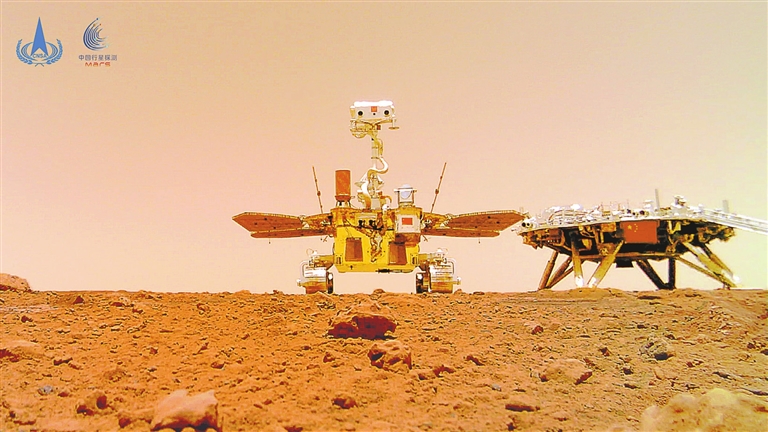
THE latest scientific research results released by China’s first Mars exploration mission showed that a large amount of liquid water activity once existed in the landing zone of Zhurong, China’s first Mars rover, about 1 billion years ago. The discovery of liquid water activity means that there may have been some conditions suitable for the origin or existence of life on Mars in the past billion years, experts explained. At the same time, the Tianwen-1 mission has also laid a solid foundation for subsequent interplanetary exploration by China. According to the China National Space Administration (CNSA), as of Sept. 15, the Tianwen-1 Mars probe had been in orbit for more than 780 days, traveling a total of 1,921 meters, completing its scientific exploration tasks and acquiring 1,480 gigabytes of raw scientific exploration data, China Central Television reported Sunday. Through the comprehensive study of typical landforms such as concave cones, wall impact craters and trenches distributed in the landing area, the scientific research team has revealed the important connection between the formation of landforms and water activity in Zhurong’s landing area in Utopia Planitia on Mars. Camera images and spectroscopic data show that there are water-bearing minerals in the crustal rocks near the landing area. “As liquid water activity has been found, we believe that there may have been some suitable climate conditions for the origin of life or the existence of such conditions in the past billion years on Mars,” said Liu Yang, a researcher at the National Space Science Center of the Chinese Academy of Sciences (CAS). “These climate conditions are likely to be in a more moderate space underground.” These new results reveal the influence of Martian sand and water activity on geological evolution and environmental changes, provide strong support for the conjecture that oceans once existed on the Martian plain, and enrich human scientific knowledge of the geological evolution and environmental changes on Mars, the CNSA said. The scientific research team also used the Tianwen-1 probe data to obtain a number of outstanding scientific results on the relationship between the density of rocks on the Martian surface and the degree of surface erosion, the distribution of ions and neutral particles in the near-Mars space environment, as well as the Martian gravity field. “The fact that the Tianwen-1 gives Chinese scientists first-hand data means that we can most fundamentally parse our scientific story from the raw data,” said Pan Yongxin, Tianwen-1 mission science applications chief scientist. Pan noted that the independence on obtaining data indicates that China’s initiative in scientific discovery will be enhanced. Through the Tianwen-1 mission, China has achieved hundreds of millions of kilometers of long-distance data transmission, and also mastered how to effectively extract scientific data, laying a solid foundation for subsequent interplanetary exploration. The Tianwen-1 orbiter continues to carry out scientific exploration in the remote sensing mission orbit, and continues to accumulate first-hand scientific data to contribute to the in-depth knowledge of Mars for human beings, the CNSA said. The Zhurong rover is currently in hibernation and is expected to be woken up at the end of the year when Mars environmental conditions improve. After its normal working condition is confirmed, Zhurong will continue to travel southward to obtain more roving probe data. “Chinese scientists have used their own means and technology to implement Mars exploration, and have achieved fruitful results,” said Song Zhongping, a space observer and TV commentator. This activity “has provided unparalleled first-hand information for human beings’ research and exploration of Mars.”(Global Times) | 
